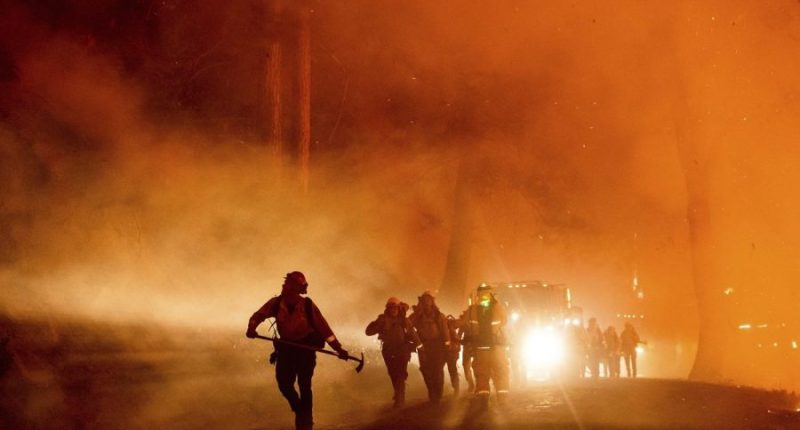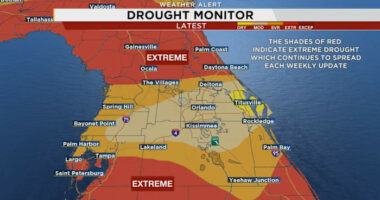Share this @internewscast.com

(The Hill) — With peak wildfire season just around the corner, residents of California and the broader U.S. West are bracing not just for the blazes, but also for ongoing cuts to the federal programs that have long served as lifelines to a region in flames.
As part of a broader effort to reduce spending, the Trump administration has slashed workforces and downsized budgets at many of the bodies responsible for managing and mitigating climate-driven weather extremes.
“The fact of the matter is, the same level of federal response will not be mustered this year as has been mustered in the past, and may not be mustered at all,” Rob Moore, a policy analyst for Natural Resources Defense Council (NRDC), told The Hill.
Chief among the entities on the chopping block has been the Federal Emergency Management Agency (FEMA), which President Donald Trump promised to overhaul. Other cuts have hit the Department of Energy, the National Oceanic and Atmospheric Administration (NOAA) and the National Weather Service (NWS).
On the other hand, Trump on Thursday signed an executive order focused on wildfire prevention, directing the Interior and Agriculture department chiefs to “consolidate their wildland fire programs.” The order also ordered the Defense Department to sell excess aircraft parts that could bolster mitigation and response, while calling upon agencies to loosen rules on prescribed burns and fire retardant use.
An accompanying fact sheet described the directives as “returning common sense to wildfire prevention and response,” while the order itself slammed California’s response to the wildfires that ravaged Los Angeles in January.
The winter wildfires, according to the order, were a testament to “the catastrophic consequences when State and local governments are unable to quickly respond to such disasters.”
“In too many cases, including in California, a slow and inadequate response to wildfires is a direct result of reckless mismanagement and lack of preparedness,” the order stated.
The order stopped short, however, of centralizing federal firefighting efforts into one entity a controversial plan included in Trump’s 2026 budget proposal.
Meanwhile, Trump and Homeland Security Secretary Kristi Noem earlier this week announced possible intentions to eliminate FEMA “as it exists today” and to distribute fewer funds to states experiencing disaster, with the caveat that such changes might not occur until fall, after hurricane season.
About 2,000 full-time FEMA staffers have been either removed or left voluntarily since January, adding up to about a third of the agency’s 6,100-person workforce, according to media reports. The agency’s former acting head, Cameron Hamilton, was fired a day after telling Congress that axing FEMA wouldn’t be “in the best interest of the American people.”
The Trump administration in April also ended FEMA’s Building Resilient Infrastructure and Communities program, which distributed federal funding to states, tribes and local groups working on hazard mitigation projects. At the time, an agency spokesperson spoke of “yet another example of a wasteful and ineffective FEMA program.”
In addition to these cuts, the agency considered slashing billions of dollars in grants based on the immigration policies of certain cities. Earlier this spring, FEMA announced that it was canceling National Fire Academy training courses, provided for free to firefighters and other first responders.
Meanwhile, NOAA has lost about 20 percent of its staff through layoffs and buyouts, while the NWS has experienced a 10 percent reduction since the beginning of the year, according to the Center for Economic and Policy Research, a U.S. think tank that focuses on economic and social issues.
To Stuart Gabriel, director of the University of California Los Angeles’ Ziman Center for Real Estate, the weather-related cuts are of particular concern ahead of peak wildfire season, since most of the country’s precise forecasting comes from the federal government.
“Without the precision of weather forecasting, we’re sort of walking around in the dark,” said Gabriel, who leads the advisory committee for Project Recovery a multi-institutional effort to rebuild Los Angeles after January’s catastrophic fires.
Describing California firefighting efforts as a now “year-round activity,” Gabriel stressed the need for “a high level of preparedness and a high level of potential deployment throughout the year.”
“The withdrawal of federal resources and the lack of funding of traditional federal functions is entirely threatening to this effort,” he added.
Gabriel said he finds it “highly distressing” to watch government officials ignoring scientific data and thereby “pushing humankind backwards.”
Extreme weather events, he argued, should be confronted in a bipartisan manner, as events like tornadoes, hurricanes and wildfires “are issues that affect everyone.”
In response to efforts to downsize FEMA, Moore from NRDC argued in a recent essay that “America’s disaster safety net is unraveling,” describing the agency as “one of the leading climate resilience agencies.” His remarks accompanied comments filed to FEMA by his organization about the “weaponization of federal disaster assistance” and Trump threats to withhold funding from California.
The administration has been increasingly at loggerheads with the Golden State, sending in the military to referee immigration protests and signing resolutions to block the state’s emissions rules.
Trump warned in a Truth Social post on California last month “that large-scale Federal Funding will be held back, maybe permanently” after a transgender high schooler made the state track and field championships.
“The actions that the administration is taking is really having an impact on not just federal disaster preparedness and response, but also state and local,” Moore told The Hill.
“They’re doing things that are also inhibiting training of local and state first responders,” he added.
Pulling out even just one component such as FEMA from the region’s disaster response system “causes ripples through the whole system,” according to Steven Jensen, a professor in emergency response services at California State University Long Beach.
“That entire system is going through chaotic, radical change,” Jensen told The Hill, acknowledging that the existing system has been far from perfect.
“There was a lot that needed to be done, but there’s something to be said for slow, steady progress,” he said.
Nonetheless, both Jensen and Moore held out some hope for California, which Jensen described as in “a lot better position” than many other states in terms of disaster readiness.
“California is well practiced at this,” he continued. “We figured out how to do disaster, and we will find our way through.”
Recognizing that federal cuts may pose challenges to California and its neighbors as they fight wildfires in the near term, Moore identified a “speculative silver lining” for the long term.
“This may help states wake up to the fact that they have a primary responsibility addressing known vulnerabilities,” Moore said. “This will jump-start some real recognition.”











